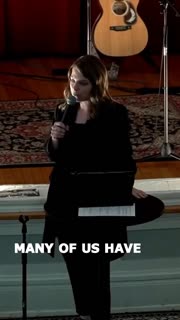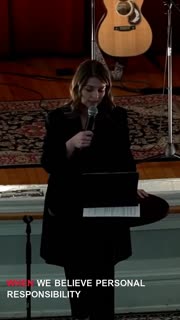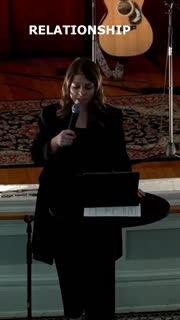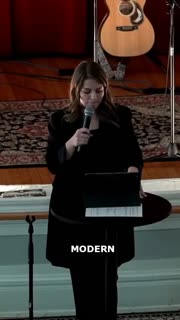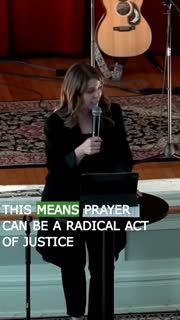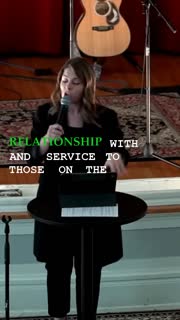Embracing Justice: The Call to Serve Together
Devotional
Sermon Summary
Bible Study Guide
Sermon Clips
1. "Many of us have adopted a philosophy that says certain people or ministries are called to serve the poor, vulnerable, and struggling as a way of shifting our responsibility onto other people. And there are a few reasons why both Christians and non-Christians alike do this. Number one, personal responsibility. There are many who do not serve because of their belief in personal responsibility. They believe that they have worked hard for what they have, and that others should too." [01:29] (32 seconds)
2. "When we believe personal responsibility is the only thing that matters, we can quickly dismiss those who struggle as undisciplined or lazy. And this is not the heart of Jesus as we will see today. The second reason why people do not volunteer is passivity. Many of us have grown up with certain privileges in life that have either kept us from understanding the plight of poverty or have kept us at arm's length from those in need." [03:02] (29 seconds)
3. "Relationship with and service to those on the margins is a gospel mandate. And Jesus demonstrates what this looks like when we read Matthew chapter 1 starting in verse 12. So if you would turn there in your Bible or if you want to follow along on our gathering guide today, just hit today's liturgy, scroll down, and you'll see the sermon notes." [04:34] (25 seconds)
4. "Modern Christianity has a tendency to divorce or separate personal righteousness or devotion to God from acts of outward justice. But interestingly enough, the biblical text does not do this. In the Hebrew, the word for personal righteousness is tzaka. Any guesses on what it is for justice? Tzaka. They're the same. This means that when we read the scriptures, the term justice and the term righteousness are interchangeable." [09:41] (35 seconds)
5. "This means prayer can be a radical act of justice as we talk to God about what we are working on together. This means fasting can be a powerful act of solidarity as we experience the pain of food insecurity and hungry. This means that almsgiving, service to the hurting, can be an act of devotion and righteousness. That in serving, we declare our love for God and praise to him." [11:15] (29 seconds)
6. "Relationship with and service to those on the margins is not an optional expression of Christianity, but an inseparable part of what it means to follow Jesus. I think American journalist and social activist Dorothy Day sums this up well. When asked, how do you live the gospel? She responded by saying, stay close to the poor." [12:53] (26 seconds)
7. "You cannot divorce private forms of righteousness from outward social justice. You cannot devote yourself to Jesus through prayer and fasting and also disregard those on the margins. You cannot live the gospel and ignore the poor. And this is what Jesus demonstrates time and time again. And in our story today, he calls out the injustice that had invaded the temple and he enacts justice in two ways." [14:33] (32 seconds)
8. "For the first time in thousands of years, Jesus welcomes the blind and the lame into the temple, into his house. And he doesn't just send out invitations. He heals them. He meets them where they're at. He draws close. He gets intimate. He dignifies them by saying, you are now a part of the house of God and the family of God. Welcome." [23:04] (26 seconds)
9. "Here is my vision for you, church, that through serving the city, you would discover that you are not alone. You are not alone. You are not alone. You are not alone. That you have love over family. That you would enter into rich and deep relationships with those that look different from you. That you would have dinner with individuals across social class lines with those that live across town." [24:48] (26 seconds)
10. "Kansas City does not need a church with all the right political persuasions, posts, and stances. Kansas City needs a new kind of family. A community where friendships don't make sense. A community that ignores the rules of the world. A community that ignores the first unspoken codes of conduct. And a community that crosses invisible dividing lines." [29:52] (18 seconds)
Ask a question about this sermon
2. "When we believe personal responsibility is the only thing that matters, we can quickly dismiss those who struggle as undisciplined or lazy. And this is not the heart of Jesus as we will see today. The second reason why people do not volunteer is passivity. Many of us have grown up with certain privileges in life that have either kept us from understanding the plight of poverty or have kept us at arm's length from those in need." [03:02] (29 seconds)
3. "Relationship with and service to those on the margins is a gospel mandate. And Jesus demonstrates what this looks like when we read Matthew chapter 1 starting in verse 12. So if you would turn there in your Bible or if you want to follow along on our gathering guide today, just hit today's liturgy, scroll down, and you'll see the sermon notes." [04:34] (25 seconds)
4. "Modern Christianity has a tendency to divorce or separate personal righteousness or devotion to God from acts of outward justice. But interestingly enough, the biblical text does not do this. In the Hebrew, the word for personal righteousness is tzaka. Any guesses on what it is for justice? Tzaka. They're the same. This means that when we read the scriptures, the term justice and the term righteousness are interchangeable." [09:41] (35 seconds)
5. "This means prayer can be a radical act of justice as we talk to God about what we are working on together. This means fasting can be a powerful act of solidarity as we experience the pain of food insecurity and hungry. This means that almsgiving, service to the hurting, can be an act of devotion and righteousness. That in serving, we declare our love for God and praise to him." [11:15] (29 seconds)
6. "Relationship with and service to those on the margins is not an optional expression of Christianity, but an inseparable part of what it means to follow Jesus. I think American journalist and social activist Dorothy Day sums this up well. When asked, how do you live the gospel? She responded by saying, stay close to the poor." [12:53] (26 seconds)
7. "You cannot divorce private forms of righteousness from outward social justice. You cannot devote yourself to Jesus through prayer and fasting and also disregard those on the margins. You cannot live the gospel and ignore the poor. And this is what Jesus demonstrates time and time again. And in our story today, he calls out the injustice that had invaded the temple and he enacts justice in two ways." [14:33] (32 seconds)
8. "For the first time in thousands of years, Jesus welcomes the blind and the lame into the temple, into his house. And he doesn't just send out invitations. He heals them. He meets them where they're at. He draws close. He gets intimate. He dignifies them by saying, you are now a part of the house of God and the family of God. Welcome." [23:04] (26 seconds)
9. "Here is my vision for you, church, that through serving the city, you would discover that you are not alone. You are not alone. You are not alone. You are not alone. That you have love over family. That you would enter into rich and deep relationships with those that look different from you. That you would have dinner with individuals across social class lines with those that live across town." [24:48] (26 seconds)
10. "Kansas City does not need a church with all the right political persuasions, posts, and stances. Kansas City needs a new kind of family. A community where friendships don't make sense. A community that ignores the rules of the world. A community that ignores the first unspoken codes of conduct. And a community that crosses invisible dividing lines." [29:52] (18 seconds)
